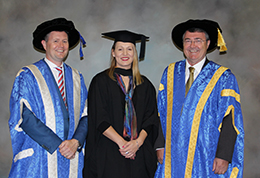05 April 2016
 For UniSA’s 150,000th graduate Sally Perrin, crossing the stage at graduation ceremonies with a Bachelor of Psychological Science on April 5, will be triumph over adversity.
For UniSA’s 150,000th graduate Sally Perrin, crossing the stage at graduation ceremonies with a Bachelor of Psychological Science on April 5, will be triumph over adversity.
Sally epitomises the kind of student for which UniSA was founded 25 years ago this year – capable, intelligent, with a passion to learn, but someone whose background would probably have been a huge barrier to university entry.
She left home before completing high school and had to earn her own living and fend for herself from the time she was 15 years old.
Within a short time, she was also caring for her younger sister, working and studying hard to complete high school.
“I could see that education was a path out of poverty and way to help others who may face similar challenges in life” Perrin says.
“When they told me I was the 150,000th graduate I was absolutely delighted – it feels like a real honour, something quite special.”
Perrin completed her degree part time over six years and is now enrolled in an honours degree in psychology with a clear plan to continue on to Masters or PhD study.
“I really want to be able to combine research and practice to support a range of vulnerable people,” Perrin says.
“I think when you see how front line services operate for marginalised people you realise they are structured on a business model and that’s a long way from the evidence-based practice model of human service provision.
“I’m very interested in the role psychosocial factors play in human behaviour such as culture and environment, specifically in relation to negative health outcomes. For instance how are behaviours influencing physiological changes that lead to longer term epigenetic changes which are associated with an increased risk in developing a mental health condition or non-communicable diseases”.
“I am looking to research stress and epigenetic changes, mainly from a developmental perspective, and one way we can do that is through sleep and circadian rhythms.”
Perrin says exploring a simple variable such as sleep is quite powerful.
“Imagine a child in a family or situation, surrounded by chaos and insecurity. They can become fearful and sleep-deprived. When they go to school, they are overtired and inattentive and might be labelled as lazy or disengaged. They may find it difficult to make friends because of their poor performance in class and their overtiredness. This again isolates them from positive rewards – the things that give the brain the right stimuli for high function.
“I want to research more in that space and ultimately, to be able to combine research and practice in my life so that I can apply the knowledge where it is most needed.”
Perrin says how the research can be applied to improve services and better support people with mental health and other disadvantages is a great motivator.
“I think UniSA is the kind of university that actually does inspire you to want to make a difference,” she says.
“I have had some very valuable support here in an everyday sense from the great people who work and teach here and also with bonuses such as the equity scholarship which I was awarded last year and it paid for a much needed new laptop.”
Perrin will be graduating on April 5 at 3pm at the Adelaide Convention Centre. She will be one of almost 5000 new UniSA graduates from across South Australia.
Media contact: Michèle Nardelli office +61 883020966 mob 0418823673 email michele.nardelli@unisa.edu.au


